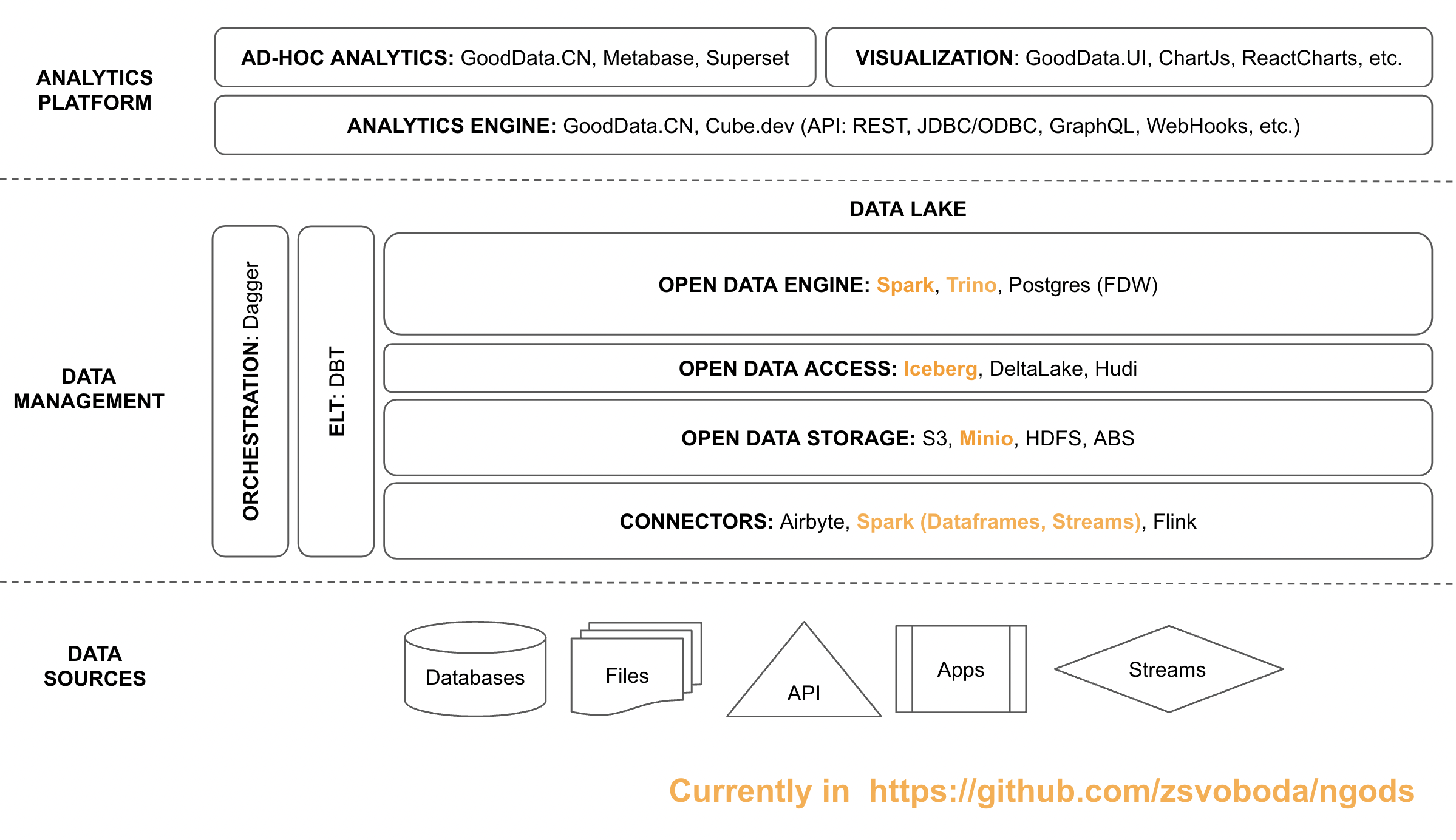https://github.com/zsvoboda/ngods
New generation opensource data stack
https://github.com/zsvoboda/ngods
analytics data data-pipeline iceberg jdbc presto prestodb prestosql python scala spark spark-sql sparksql sql trino trinodb
Last synced: about 1 month ago
JSON representation
New generation opensource data stack
- Host: GitHub
- URL: https://github.com/zsvoboda/ngods
- Owner: zsvoboda
- License: bsd-3-clause
- Created: 2022-05-20T10:30:48.000Z (about 3 years ago)
- Default Branch: main
- Last Pushed: 2022-05-20T15:50:41.000Z (about 3 years ago)
- Last Synced: 2025-03-29T06:51:34.376Z (about 2 months ago)
- Topics: analytics, data, data-pipeline, iceberg, jdbc, presto, prestodb, prestosql, python, scala, spark, spark-sql, sparksql, sql, trino, trinodb
- Language: Dockerfile
- Homepage:
- Size: 1.62 MB
- Stars: 65
- Watchers: 4
- Forks: 9
- Open Issues: 1
-
Metadata Files:
- Readme: README.md
- License: LICENSE
Awesome Lists containing this project
README
# ngods: opensource data stack
This repository contains Docker compose script that creates opensource data analytics stack on your local machine.

Currently, the stack consists of multiple components:
- [**Trino**](https://trino.io/) for low-latency distributed SQL queries
- [**Apache Spark**](https://spark.apache.org/) for data pipeline
- [**Apache Iceberg**](https://iceberg.apache.org/) for atomic data pipeline with schema evolution, and partitioning for performance
- [**Hive Metastore**](https://cwiki.apache.org/confluence/display/hive/design#Design-Metastore) for metadata management (metadata are stored in MariaDB)
- [**Minio**](https://min.io/) for mimicking S3 storage on a local computer
I plan to add more components soon:
- [**Postgres**](https://www.postgresql.org/) for low-latency queries (if Trino on Iceberg doesn't provide satisfactory low-latency queries). I'll also add Postgre Foreign Data Wrapper technology for more convenient ELT between Trino and Postgres
- [**DBT**](https://www.getdbt.com/) for ELT on top of Spark SQL or Trino
- [**GoodData.CN**](https://www.gooddata.com/developers/cloud-native/) or [**Cube.dev**](https://cube.dev/) for analytics model and metrics
- [**Metabase**](https://www.metabase.com/) or [**Apache Superset**](https://superset.apache.org/) for dashboards and data visualization
## How ngods works: Simple example
You can simply start the ngds by executing
```bash
docker-compose up
```
from the top-level directory where you've cloned this repo.
Once all images are pulled and all containers start, open Minio in your browser [http://localhost:9000](http://localhost:9000) log in with ```minio``` username and ```minio123``` password and create a top level bucket called ```bronze``` .
Then use your favorite SQL console tool (I use [DBeaver](https://dbeaver.io/)) and connect to the Trino instance running on your local machine (jdbc url: ```jdbc:trino://localhost:8080```, username: ```trino```, empty database) and execute the following script:
```sql
create schema if not exists warehouse.bronze with (location = 's3a://bronze/');
drop table if exists warehouse.bronze.employee;
create table warehouse.bronze.employee (
employee_id integer not null,
employee_name varchar not null
)
with (
format = 'parquet'
);
insert into warehouse.bronze.employee (employee_id, employee_name) values (1, 'john doe');
insert into warehouse.bronze.employee (employee_id, employee_name) values (2, 'jane doe');
insert into warehouse.bronze.employee (employee_id, employee_name) values (3, 'joe doe');
insert into warehouse.bronze.employee (employee_id, employee_name) values (4, 'james doe');
select * from warehouse.bronze.employee;
```
## How ngods works: Loading parquet file as table
Now we'll load the February 2022 NYC taxi trip data parquet file as a new table to ngods.
First, create a new ```nyc``` directory in the ```./data/stage``` directory and download the [February 2022 NYC taxi trips parquet file](https://s3.amazonaws.com/nyc-tlc/trip%20data/fhvhv_tripdata_2022-02.parquet) to it.
Then open and execute the ngods [Spark notebook script](http://localhost:8888/notebooks/notebooks/spark.nyc.taxti.example.ipynb) that loads the data as a new table to the ```bronze``` schema of a ```warehouse``` database.
```python
df=spark.read.parquet("/home/data/stage/nyc/fhvhv_tripdata_2022-02.parquet")
df.writeTo("warehouse.bronze.ny_taxis_feb").create()
```
Now open your SQL console again, connect to the the Trino instance running on your local machine (jdbc url: ```jdbc:trino://localhost:8080```, username: ```trino```, empty database) and execute this SQL queries:
```sql
select count(*) from warehouse.bronze.ny_taxis_feb;
select
hour(pickup_datetime),
sum(trip_miles),
sum(trip_time),
sum(base_passenger_fare)
from warehouse.bronze.ny_taxis_feb group by 1 order by 1;
```
You should see your query results in no time!